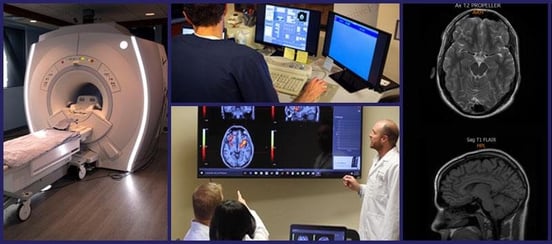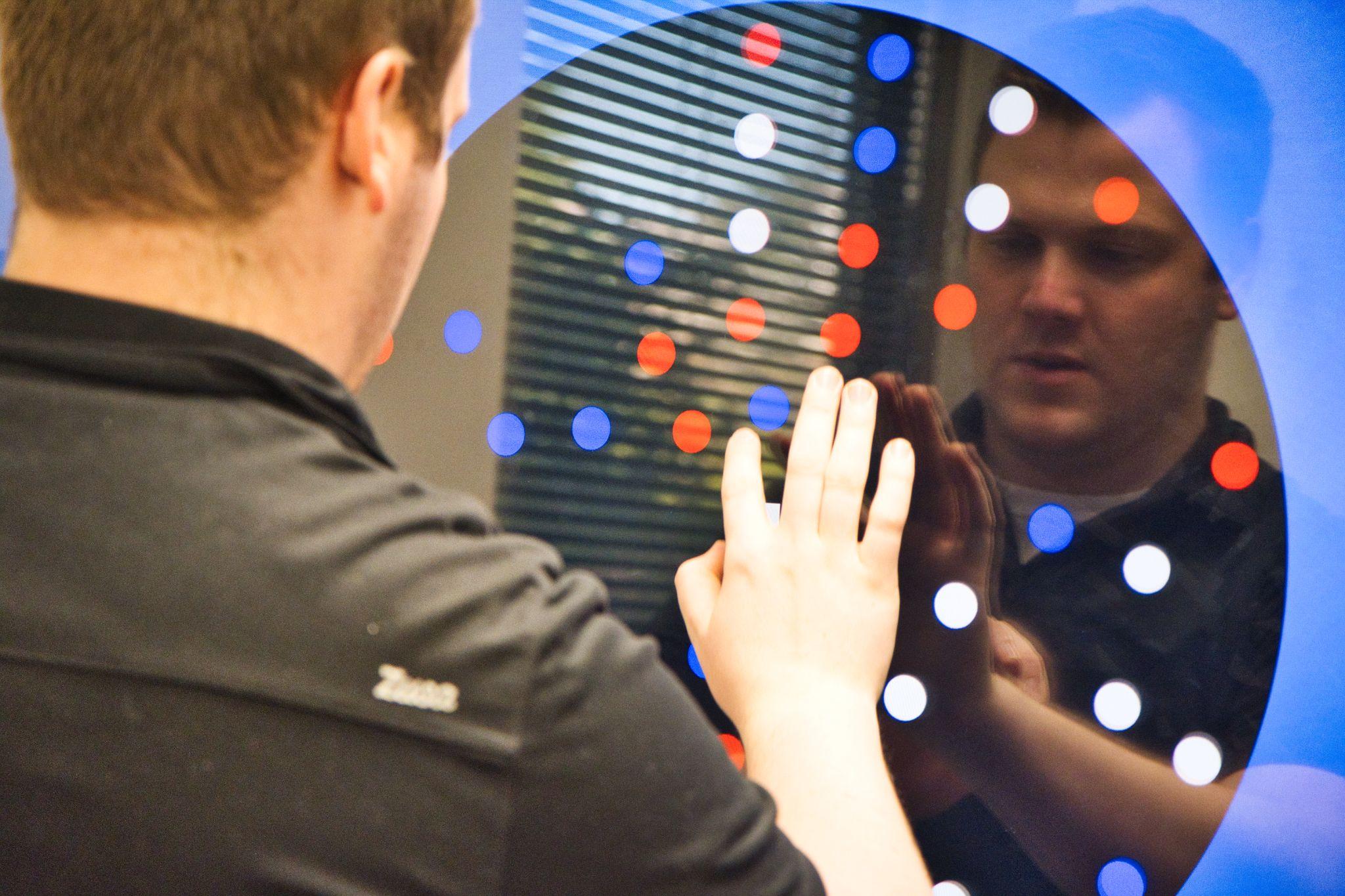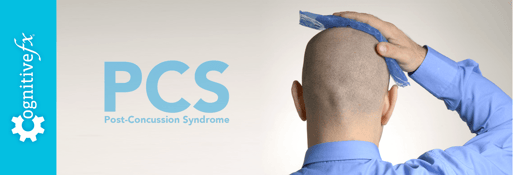Sustaining a traumatic brain injury can be a challenging experience. You probably felt angry, demoralized, helpless, and even hopeless in the days following your injury. For some people, these feelings eventually subside and disappear — but that didn't happen for you.
First, know that you are not alone: Up to 30% of concussion patients have long-lasting symptoms after their head injury. This is referred to as post-concussion syndrome (PCS) and may include symptoms such as brain fog, headaches, nausea, memory problems, and blurry vision.
Over 80% of our post-concussion syndrome patients report “personality changes” and mental health problems such as depression, post-traumatic stress disorder (PTSD), irritability, tearfulness, and more.
For some, the list of symptoms also includes suicidal thoughts. Suicidal ideation can be overwhelming and terrifying, or at the very least, unsettling. But it’s important to know that these thoughts don’t come from you; they are a side effect of your brain injury. The concussion you suffered can distort your thinking and emotions, so it becomes harder to see different solutions and find a way to move forward.
No matter how long you’ve had suicidal thoughts and feelings, this doesn’t have to be a permanent state. With the right help, you can improve, just like the many other brain injury patients who have gotten help before you.
The crucial point here is to find the right help to treat both your mental health and physical symptoms. Treating your brain injury will go a long way to make you feel better. In the meantime, it’s very important to address your suicidal thoughts.
Don’t let anyone tell you that you can get over these thoughts by simply wishing them away or “toughening up.” Depression and suicidal feelings can be treated by a doctor, just like diabetes or high blood pressure. Therapists, counselors, psychologists, and the treatment team at Cognitive FX can help you find solutions that otherwise may not be obvious to you.
In this article, we’ll explain what could be causing your suicidal feelings and putting you at a risk of suicide, as well as suggest ways to cope and move forward with the right treatment. We cover:
Over 80% of our patients have experienced emotional symptoms after a concussion. Many of those symptoms resolve shortly after treatment at our clinic (although serious mental health issues such as depression and anxiety can take additional therapy to resolve). If you’d like to learn more about how we can help you, schedule a consultation.
Note: Any data relating to brain function mentioned in this post is from our first generation fNCI scans. Gen 1 scans compared activation in various regions of the brain with a control database of healthy brains. Our clinic is now rolling out second-generation fNCI which looks both at the activation of individual brain regions and at the connections between brain regions. Results are interpreted and reported differently for Gen 2 than for Gen 1; reports will not look the same if you come into the clinic for treatment.
Get Help Now
If you're feeling overwhelmed by suicidal thoughts and you have strong urges to take your own life, get help immediately.
- Call 911 or your local emergency number now if you are in any danger of committing suicide.
- Call a suicide hotline: You can connect with a counselor who can help you deal with your feelings in a safe way. These lines are free, and you don’t have to provide any personal information. In the U.S., you can call the National Suicide Prevention Lifeline 24/7 at 1-800-273-8255.
- Make your environment safe: If you’re feeling suicidal, ask a friend or relative to remove any items that can potentially be dangerous, such as knives or medications. If you own a firearm, ensure it’s stored in a locked container and separate from ammunition.
- Don’t keep suicidal thoughts to yourself: It’s crucial that you reach out. Don’t let shame or embarrassment stop you from seeking help. Set an appointment with a psychologist or doctor you can trust, and talk to them about your feelings.
- Know that people do get through this: It may be hard to believe at the moment, but many other people — both those who have had a mild traumatic brain injury like you and those with other reasons for their feelings — have pulled through and learned to have hope again. With proper treatment and support, you can relearn how to enjoy your life again.
Want to hear from another survivor? Anthony Loubet, an attorney and father of six, suffered from severe depressive episodes after his traumatic brain injury (TBI). His symptoms were so bad that he was afraid he’d never work again. After recovering, he’s able to work and feel fully present to his family. The experience gave him a new view on life, and he now takes more time to slow down, take care of himself, and enjoy each moment to the fullest.
Why do I feel suicidal after a brain injury?

These feelings only started after the head injury. Sometimes you may be able to ignore them, but other times they stick around in your mind. Many people before you have had suicidal thoughts at some point after a concussion.
For some, they’re just fleeting thoughts of falling asleep and never waking up, while others make intensely detailed plans. Studies show that having suicidal thoughts is seven times more common in PCS patients than in the general population.
There are many risk factors that contribute to these thoughts and feelings as a consequence of a brain injury, and it varies immensely from person to person.
Suicidal Thoughts as an Emotional Response to Injury
A brain injury — especially if it has long-lasting consequences — can be emotionally traumatic. Difficulties often arise as patients struggle to adjust to their new reality, even if the concussion symptoms are just temporary.
Patients often feel helplessness and hopelessness, especially when their injury wasn’t their fault (or was an accident that could have happened to anyone). Being told that their issues are “all in your head” by friends or doctors can further compound these emotions.
A traumatic brain injury alters the way the brain works, making it difficult for survivors to do things they used to be able to do easily. This could include sports, hobbies, playing with their kids, and even communicating with loved ones.
To make things worse, issues such as losing a job or a change in family dynamics can create feelings of hopelessness, irritability, and frustration. Some patients react with mood swings and outbursts of anger, while others may become sad and withdrawn.
As these patients realize they’re unable to return to their pre-injury lifestyle, the added stress of coping with post-concussion symptoms such as headaches, dizziness, and cognitive issues put patients at increased risk for suicidal thoughts.
It’s important to note that you’re feeling like this because your brain is trying to protect itself. Our brain has two systems to control how we react with the environment around us: the behavioral activation system, and the behavioral inhibition system.
Under normal circumstances, the behavioral activation system is more prominent. It helps us feel rewarded for learning a topic or enjoying a new activity.
However, the behavioral inhibition system also monitors everything we do, particularly if we experience a loss or a negative emotion. If the losses start adding up — as it may happen in the aftermath of a brain injury — it can block the behavioral activation system.
And once the behavioral inhibition system is in control, it stops you from feeling any pleasure or reward from something you used to enjoy before the injury, in an effort to protect you from further losses. As a result, you can feel like you’ll never get better, which then triggers suicidal thoughts.
We often have patients surprised at how they can’t feel anything — even toward their children — and how everything post-injury becomes so robotic.
If you want to find out more about these two systems, we’ve written about them in more detail here.
Suicidal Thoughts Caused by Physical Changes in the Brain
Suicidal thoughts may also result from a direct impact on the areas of the brain that control emotions, memory, and executive skills. Studies have shown that concussion patients who go on to develop depression and suicidal thoughts are much more likely to experience damage to the hippocampus (which plays essential roles in emotion and behavior), and to the orbitofrontal cortex (a region involved in the cognitive process of decision-making).
We have seen this first hand. For example, about 63% of the patients we treat at Cognitive FX have abnormal fMRI scans in at least one of their hippocampi. We know this damage occurs because brain injuries disrupt normal blood flow within the brain.
As a result, some parts of the brain — such as the hippocampus — don’t receive enough oxygen to complete a particular task, such as forming a long-term memory or knowing how to behave in a social situation. Other parts of the brain may try to compensate, but it’s often not very effective. This is known as neurovascular coupling dysfunction and is one of the root causes of post-concussion symptoms, including suicidal thoughts.
Recent evidence shows that concussions may also affect the brain’s functions by inducing an inflammatory reaction.
Researchers in the UK found signs of neuroinflammation in depressed patients with suicidal thoughts, but not in depressed patients who weren’t suicidal. The most dramatic changes were observed in an area called the anterior cingulate cortex, where mood regulation happens — which may explain the suicidal feelings. These results raise hope for a potential target for treatment in the future to keep these feelings under control.
Hannah was feeling suicidal after four concussions and 10 years of dealing with post-concussion syndrome. Her symptoms got a lot worse after the fourth injury, and Hannah started experiencing constant headaches, a rage that she could not control, and suicidal thoughts. Hannah noticed massive improvements in how she felt almost immediately after her treatment and believes that getting treated for post-concussion syndrome was the best investment she could have made for herself.
Brain Injuries as the Result of a Suicide Attempt
So far, we’ve mentioned the higher risk of suicidal thoughts due to a head injury in patients with no history of depression or suicidal feelings.
However, there is another aspect of the story that’s worth considering: suicide attempts as the cause for the brain injury, not just the result. Sadly, patients experiencing depression or other mental health disorders can obtain a brain injury as a consequence of their suicide attempts. In this situation, addressing the patient's mental health alongside treating the brain injury is paramount for recovery.
Treating a traumatic brain injury can be challenging by itself, and adding these feelings will only make this process even more difficult. However, it’s important to remember that it’s not impossible. Your suicidal thoughts can be addressed during recovery by working with your healthcare provider to build a well-rounded approach to your treatment.
Note: Over 80% of our patients have experienced emotional symptoms after a concussion. Many of those symptoms resolve shortly after treatment at our clinic (although serious mental health issues such as depression and anxiety can take additional therapy to resolve). If you’d like to learn more about how we can help you, schedule a consultation.
How to Cope with Suicidal Thoughts from Post-Concussion Syndrome

While it may seem that these suicidal thoughts are going to stay with you forever, they are usually not permanent. With the proper treatment, you will feel better again.
In the meantime, here are some ways to help you cope with your feelings.
What to Do
- Talk with someone every day. Even if you feel like staying at home hiding from everyone, reach out to trusted friends and ask them to spend time with you. Pick something to do together that doesn’t feel overwhelming, such as a short walk in the park or going to the cinema. Going out for strenuous exercise or a session with heavy drinking, on the other hand, could make your symptoms worse. Stick with activities that don’t push your symptoms into overdrive.
- Create a schedule that suits you, and stick to it. Even when your thoughts seem out of control, a routine can help.
- Make a safety plan by developing a series of steps to follow when you’re feeling suicidal. This could include calling your doctor, as well as friends and family who can help in an emergency.
- Exercise as often as it’s safe for you. Start with a few minutes a day and build from there, as long as your symptoms during and after exercise remain mild (if you’re having trouble, read this post on how to exercise after a concussion). Every time you exercise, you get a boost of essential neurotransmitters and proteins in the brain along with improved blood flow. One of these, in particular, called Brain Derived Neurotrophic Factor (or BDNF for short), is especially important.BDNF promotes the growth of nerve cells and stimulates communication between them. This can alter neural function and modify thoughts, behavior, and even feelings. You can find out more about BDNF and how exercise can help patients recover here.
- Find a safe place. When you’re starting to feel overwhelmed, go to a place where you always feel safe. This could be your bedroom, a friend’s house, or your favorite coffee shop.
What to Avoid
- Being alone. Feeling alone can make your suicidal thoughts even worse. If you find yourself alone, visit or call a friend, find a support group, invite someone trusted to stay with you, or call a crisis helpline.
- Alcohol affects the parts of the brain that control behavior and emotions, increasing impulsivity and making you more likely to act on suicidal feelings. Drinking also aggravates some of the cognitive problems caused by your head trauma and slows down recovery. You may find that alcohol affects you more after the brain injury than it did before.
- Drugs are also likely to harm your brain. Illegal drugs such as heroin, cocaine, and methamphetamine slow down your recovery. Cannabis, which is legal in some states, is often used to prevent stress and anxiety, but for PCS patients, it has downsides. For some patients, it may cause cognitive problems with memory, attention span, and problem-solving. There isn’t much research regarding the use of cannabis by patients with a brain injury, but at the moment, the risks seem more dangerous than the benefits.
- Doing things that make you feel worse. Going through old letters or photographs, listening to sad music, or thinking about past events can all increase negative feelings and trigger your suicidal behavior.
- Worrying about your suicidal thoughts. Don’t overthink about the fact that you’re still having suicidal thoughts, as this can make them stronger. Instead of worrying, find a distraction. Go out with friends, watch a movie, or get involved with a new hobby.
How to Get Treatment for Post-Concussion Syndrome at Cognitive FX

Each patient with a brain injury is different. This makes treatment complex and challenging, to say the least. Many programs use the same two to three types of therapies for every patient, which works for some but not others.
At Cognitive FX, we follow a different approach. We know that concussions can have an impact on different parts of the brain. Knowing which areas are affected means we can customize treatment for each patient.
That’s why we start our patient evaluation with a fNCI scan. This particular type of scan permits us to identify which areas are affected by a brain injury so we can tailor treatment accordingly.

During our EPIC treatment (short for Enhanced Performance in Cognition), we use a combination of exercise and multiple types of therapy, including cognitive, neuromuscular, occupational, and sensorimotor therapy, to name just a few.
Patients also meet with a psychologist at least twice during treatment, and for those showing signs of depression or suicidal thoughts, further appointments may be scheduled.
The therapist conducts a psychological assessment to establish what may be causing your suicidal thoughts and any emotional symptoms, along with recommendations for how you can keep recovering after treatment.

At the end of the treatment period, patients get a second scan to find out how their brains improved. On average, we see improvements of over 75%, and if patients follow their homework, they experience further improvements at home.
Do I need further treatment for my suicidal thoughts?
During our EPIC treatment, we primarily focus on resolving brain dysfunction. For some patients, treating their post-concussive symptoms (such as headaches or sleep issues) has a significant impact on how they feel. In this case, it’s likely their feelings were the result of physical changes to the brain caused by the injury, and addressing these changes is enough to eliminate any mental health symptoms relatively quickly.
For other patients, recovery is not so straightforward. Treatment of post-concussion symptoms is still a step in the right direction, but these patients may need additional therapy to work through their feelings. In this case, we can refer you to a psychologist in your area to help you with any problems you may be having.Unlike friends and family, psychologists can show you effective and practical strategies for addressing suicidal thoughts, depression, anxiety, and any other mental illness over time.
Can my suicidal thoughts be treated with medication after a brain injury?
Antidepressants, anti-anxiety and antipsychotic medications, as well as other medications for mental illness are often used to reduce symptoms, which can help patients feel less suicidal.
However, this may not be the best option if you also have to contend with a brain injury. For example, with antidepressants, there is still some division amongst scientists as to whether they should be used or not: Some studies say they’re effective, while others suggest they’re not. The use of antipsychotics to treat a brain injury is also controversial. Studies suggest they cause excessive drowsiness, exacerbate cognitive deficits, and inhibit neuronal recovery.
Each case is different, and use of medication should be considered carefully between you and your doctor. It may work for some patients but not others. If we had to make a general recommendation, it would be to see medication as a last resort after you’ve undergone treatment for your post-concussion syndrome and tried psychotherapy. If you decide to go down this route, it’s important to find a doctor that understands your post-concussion syndrome and can distinguish between PCS symptoms and side effects from the medication.
Long-Term Recovery

Some patients see marked improvements after EPIC treatment, while others may take a little longer. If that’s the case for you, suicidal thoughts may not go away immediately, and you need to be prepared to deal with them during your recovery.
Here are some of our suggestions to help you during this period:
- Continue homework from Cognitive FX. Stick with the treatment plan and the “homework” we give you. Seeing improvements in your other symptoms will go a long way to make you feel better and boost your overall brain health.
- Identify triggers or situations that may start feelings of despair or generate suicidal thoughts, such as a stressful relationship, job, or an anniversary of a loss. Find a way to avoid these situations when you can, and instead focus on something positive.
- Take care of yourself. Eat a balanced meal, and follow a good sleep pattern. As described earlier, exercise is also key not only to relieve stress and promote emotional well-being but also to help heal your brain injury.
- Build your support network. Surround yourself with trusted friends and relatives who make you feel good about yourself. The more you’re invested in meeting other people, the more you can stay positive and on the recovery track.
- Develop new activities and interests. Learn a new hobby, volunteer at a local charity, or find a new job that gives you a sense of purpose. When you choose to do activities you find fulfilling, you’ll feel better about yourself, and suicidal feelings are less likely to return.
- Learn to deal with stress. Try meditation or practice breathing exercises to relax. These are healthy ways to deal with stress and control self-defeating thoughts.
- Know that you’re not crazy. Having suicidal thoughts doesn’t make you crazy or wrong. What you’re feeling is the consequence of your brain injury, and with the right treatment, it will go away.
Click here to watch Cayci’s story: According to her mother, Cayci started developing concussion symptoms, but they couldn’t pinpoint exactly when the injury occurred. Their best guess was from a very mild bump in the car, but it caused no symptoms at the time. Months later, Cayci was struggling with life and started to think it wasn’t worth living. The young woman found Cognitive FX through a friend and started feeling improvement almost immediately during her EPIC week.
What Family and Friends Can Do

For some, recovering from a head trauma can be overwhelming, while others may see it in a more positive way. Everyone is different, and there is no “normal” recovery journey.
However, whether your loved one is feeling apprehensive or a little more upbeat, it’s crucial you support them during this period. This can be anything from helping with shopping trips, to being a patient listener, to providing financial support while they get back on their feet.
Learn to adapt to what they can do. A concussion doesn’t mean they stop enjoying activities you did together, but you may just have to do things differently for a while.
Above all, if they open up to you, don’t brush off their feelings or ignore what they’re saying. This is particularly important if you’ve noticed any behavior or personality changes that may indicate they’re having suicidal thoughts. This could include, for example, having dramatic mood swings or engaging in reckless and impulsive behavior.
You can learn specifics on how to help someone struggling with a brain injury here (along with information on how to avoid caregiver burnout).
You Are Not Alone

Even if you’ve been fighting with suicidal thoughts for a long time, you are not alone.
Data from the Substance Abuse and Mental Health Services Administration (SAMHSA) for 2019 showed that 12 million Americans seriously thought about suicide, and 3.5 million even had a plan.
Most people who have suicidal thoughts do not actually act on these feelings and never attempt suicide, but nevertheless, these should never be ignored. Many people before you have gone through the same difficulties and were able to recover and improve their quality of life.
Remember, suicide is an irreversible solution to a temporary problem. It may be difficult to see it at the moment, but the feelings you have now are short-lived. With the right medical attention, you won’t always feel like this.
Note: Over 80% of our patients have experienced emotional symptoms after a concussion. Many of those symptoms resolve shortly after treatment at our clinic (although serious mental health issues such as depression and anxiety can take additional therapy to resolve). If you’d like to learn more about how we can help you, schedule a consultation.










.png?height=175&name=image2%20(5).png)





